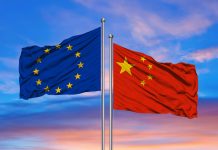| PMs of Czech Republic, Poland, Slovenia due in Kyiv | Mayor of Kyiv announces 36-hour curfew | Talks between Russian, Ukrainian officials resume
DM Monitoring
KYVI: Kyiv will impose a 35-hour curfew from Tuesday night amid a “difficult and dangerous moment” after several Russian strikes in the capital, according to Mayor Vitali Klitschko.
The curfew from 8pm (18:00 GMT) on Tuesday until 7am (05:00 GMT) on Thursday was a “decision of the military command”, Klitschko, a former boxing champion, said on Tuesday.
The announcement came as Russia launched fresh attacks in Ukraine’s capital, which has nearly been encircled by Russian troops in the third week of the invasion that has caused the biggest refugee crisis since World War II.
Kyiv has been through the worst of the fighting since Russia invaded Ukraine on February 24, but the Russian military is slowly closing in on the city and the shelling has intensified.
Two large blasts echoed across the centre of the city just before dawn on Tuesday, after late on Monday, tracer bullets flashed across the night sky as Ukrainian forces apparently targeted an enemy drone.
“Today is a difficult and dangerous moment,” Klitschko said in a statement on Telegram.
“This is why I ask all Kyivites to get prepared to stay at home for two days, or if the sirens go off, in the shelters,” the mayor said.
“Movement around Kyiv without special permits is forbidden. It is only allowed to go outside with the aim to get to the shelters,” he added.
“The capital is the heart of Ukraine, and it will be defended. Kyiv, which is currently the symbol and forward operating base of Europe’s freedom and security, will not be given up by us.”
Three leaders in Kyiv
A witness told the Reuters news agency he saw a high-rise apartment block in flames after being hit by artillery.
Firefighters tried to douse the blaze and rescue workers helped evacuate residents trapped inside using mobile ladders. A body lay on the ground in a bag.
The curfew comes as the Polish, Czech and Slovenian prime ministers were travelling to Kyiv by train on Tuesday in the first visit by foreign leaders to the capital.
Kyiv imposed a similar curfew on February 26 just after Moscow launched its invasion.
Thousands of people have been killed in the conflict and millions more displaced.
Russia, which denies targeting civilians, calls its actions a “special military operation” to “denazify” the country, a claim that Ukraine and its allies reject as a pretext for an unjustified and illegal attack.
Russia blames US for helping Ukraine to develop biological, nuclear arms
The secretary of Russia’s Security Council, Nikolai Patrushev, has accused US advisors in Ukraine of helping Kiev develop biological and nuclear weapons, according to reporting by Russia’s RIA news agency.
He said the presence of a large number of foreign consultants and advisors in Ukraine posed a threat to Russia’s security.
The United States on March 9 denied Russian accusations that Washington was operating biowarfare labs in Ukraine, calling the claims “laughable.”
Russia-Ukraine war hitting poor nations amid rising prices: UN
The United Nations chief has warned that Russia’s invasion attempt of Ukraine is holding “a sword of Damocles” over the global economy, especially over poor developing countries that face skyrocketing food, fuel and fertiliser prices.
Secretary-General Antonio Guterres told reporters on Monday that “Russia and Ukraine represent more than half of the world’s supply of sunflower oil and about 30 percent of the world’s wheat”.
He added: “Grain prices have already exceeded those at the start of the Arab Spring and the food riots of 2007-2008.”
Guterres said 45 least-developed countries import at least one-third of their wheat from Ukraine and Russia, and 18 import at least 50 percent.
These countries include Egypt, the Democratic Republic of the Congo, Burkina Faso, Lebanon, Libya, Somalia, Sudan and Yemen, he said.
“All of this is hitting the poorest the hardest and planting the seeds for political instability and unrest around the globe,” Guterres warned, saying the most vulnerable nations have already been trying to recover from the COVID-19 pandemic and contend with record inflation, rising interest rates, and looming debt before the Ukraine war.
Guterres announced an additional $40m from the UN’s emergency fund to move critical supplies of food, water, and medicine into Ukraine, where at least 1.9 million people are displaced.
More than 2.8 million others have fled Ukraine to other countries.
A UN humanitarian staff report said in the besieged southern port city of Mariupol trapped civilians face life-threatening shortages of food, water, medicine and other basic necessities, UN deputy spokesman Farhan Haq said.
The UN has reached 600,000 people in Ukraine with some form of humanitarian assistance, he added, but the UN’s flash appeal for $1.1bn to assist six million people inside Ukraine for an initial three months has received only $219m so far. Haq urged countries that made pledges to turn them into cash.
On Sunday, three UN agencies appealed for an immediate end to attacks on healthcare facilities, saying since the start of the war 24 medical facilities and five ambulances were damaged or destroyed and at least 12 people were killed and 34 wounded.




